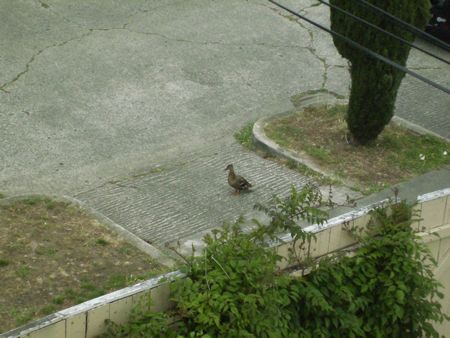The Mallard who is nesting in the basement stairwell of our building had six ducklings two days ago. Carol has been supplying the mother and her ducklings with water and food (greens and rolled oats), but sometime yesterday two of them died of unknown causes. Just now I heard the mother quacking furiously, and I ran out onto our balcony in time to see a white-and-gray cat scramble up over the fence with two ducklings in its mouth. The mother duck followed the cat out to the street and kept quacking in the direction the cat disappeared.
Carol and I met one of our downstairs neighbors in the yard. We all looked down into the stairwell: the mother duck was there with just two living ducklings, and there was blood on the concrete path at the top of the stairs. While I’m sure the mother duck feels safe down in that cosy little stairwell, staying there means that her babies are (as Carol pointed out) sitting ducks for any cat hunting in the neighborhood.
Post script to cat owners: This was no feral cat that caught the ducklings; it was plump, well-fed, and clean, and obviously someone’s pet. I wish cat owners would keep their pets indoors:– it’s better for the cat, since indoor cats are far less likely to get feline AIDS, or to become coyote snacks;– and it’s much better for the birds of the neighborhood, who won’t become cat chow.
Further update: Carol finally called the Peninsula Humane Society & SPCA, who sent an animal control officer. It was pretty clear that in a neighborhood full of cats, the remaining two ducklings wouldn’t last another day. Olivia-the-Humane-Officer arrived at about seven in the evening; the mother duck flew away (apparently a common occurrence), so Officer Olivia had to take the two ducklings with her. In thanks, we made a donation to the Humane Society in honor of “all humane officers.”


And then the mother duck flew back to find her brood. So sad. The Humane Society agent says the ducklings are hybrid Mallard and domestic and so likely will grow up on a farm, not introduced to the wild.
Photos and followup: http://carol-steinfeld.com/blog/?p=226